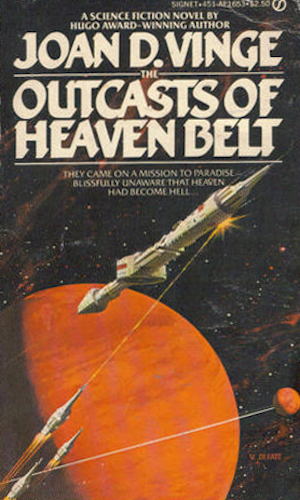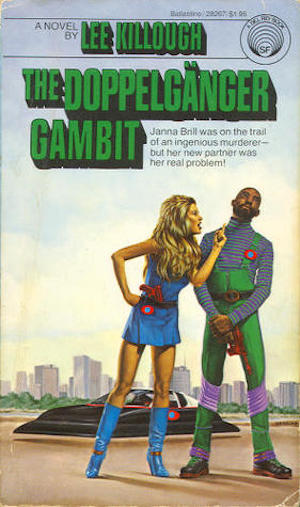Vintage SF fans are prone to lamenting the way that excellent vintage works are falling out of print and not being read. Now, I could offer the slim comfort that this has always been the way of the world, and particularly of the publishing world. Wait a century and people may be asking “Connie Willis who?” in the same tone as they now say “Roger Zelazny who?” However, I already wrote that piece and even I don’t think I can get away with selling the same thing to Tor.com twice.
Instead, let’s talk about five older novels that you might not have read that would reward a perusal…
Doorways in the Sand by Roger Zelazny (1976)

Let’s start with Zelazny, since I’ve already mentioned him. A cursory check of my library shows that I have an entire shelf of his books, none of which I can remember reading. This might be functionally equivalent to owning a stack of brand-new Zelazny novels. What fun!
A notable exception is 1976’s Doorways in the Sand, which I remember fondly. Protagonist Fred Cassidy is the beneficiary of a trust fund that pays him an educational stipend, one that will last only until he graduates. Naturally he is determined to live a carefree student life as long as he can. He avoids graduation through a series of increasingly creative dodges.
Alas for poor Fred, he is dragged from his comfortable academic existence into a life of thrilling adventure, becoming a central player in events of potentially galactic scale.
To steal someone else’s phrase, Doorways in the Sand is a perfect minor novel. This may sound like damning with faint praise, but the art of the minor novel is trickier than it appears. Zelazny’s prose is deceptively clear, his recurring stylistic trick (starting each chapter with Fred up to his neck in trouble, then explaining how that came to be) is effective, and the first-person wise-ass narrative is engaging.
Outcasts of Heaven Belt by Joan D. Vinge (1978)

When advanced technology was easily available, the asteroids of Heaven Belt were home to humans living in luxury. In the wake of the Civil War, much technology was lost. Now only the asteroids of Demarchy and Grand Harmony cling to survival. Both are declining. They may kid themselves, but eventual extinction seems certain.
Bussard ramjet Ranger arrives in Heaven Belt unaware of the Civil War and of the desperate straits in which the asteroids’ survivors find themselves. Ranger’s fusion reactor is the sole functioning fusion reactor in the system; it is a treasure beyond compare. Ranger’s crew, on the other hand, is decidedly expendable. If only the crew had known that before it was too late to run…
Outcasts was written during the height of the space colony fad. Vinge’s novel crafts its setting from the observation that space colonies are fragile in a way that communities on habitable worlds are not.
The novel is also notable because Vinge doesn’t sort her characters into good guys and bad guys. They are all facing dire problems; they may not agree on how to deal with them, but they all have good reasons to act as they do.
The Exile Waiting by Vonda McIntyre (1975)

The Earth used up its resources settling the worlds now known as the Sphere. Its ungrateful children repaid their debt to the mother world by leaving Earth to impoverished squalor. It has become a dead-end world where a tiny elite brutally exploits the masses.
Mischa and her brother Chris, languishing under the rule of their cruel uncle, hope to escape from Earth. Pseudosibs Subone and Subtwo, craving an easily dominated backwater, escaped to Earth. Subone glories in the decadence Earth offers but Subtwo has qualms. Subtwo may be the ally that Mischa and Chris need.
Exile manages to cram an awful lot of plot into just two hundred or so pages. It also manages an even more difficult trick: all the characters are somewhat sympathetic. They have just been forced by circumstance into unpleasant choices. (See previous note re: Outcasts.)
The Doppelgänger Gambit by Lee Killough (1979)

Shawnee County starship-broker Jorge Hazlett had a simple dream: to sell gullible colonists a Boeing Starmaster 1000 Bussard Ramjet, provide them with a more down-market Boeing Starmaster 800, and pocket the difference. It was a perfect plan, save for the fact that before their starship failed them in deep space, the colonists were able to send a final signal. Killing 900 people due to greed could earn Hazlett the death penalty.
There is an obvious solution. Hazlett can frame his business partner, Kellner, and then murder Kellner so that he’s too dead to defend himself. The catch? Not only is the America of tomorrow a nation that constructs starships, it’s also a total surveillance state. Committing murder is easy enough, but getting away with it should be impossible…but not for Hazlett, who is sure that he has a cunning plan.
This book reminded me of the venerable Columbo TV series. It pits Detectives Janna Brill and her eccentric partner Mahlon “Mama” Maxwell against a rich man who has confused his own talent for hasty improvisation with genius. The specifics of the surveillance state as seen in 1979 differs from the reality of 2022, but it still rings true.
[I regret to add that the case isn’t solved through cunning questioning so much as by relentless badgering.]
The Face in the Frost by John Bellairs (1969)

The wizard Prospero enjoys a pleasant life in retirement, a life that features desultory magic and occasional visits from noted philosopher Roger Bacon. Prospero has never in his wildest dreams wanted a life of travel and danger… but that’s what he gets when he is forced to face an existential threat.
Prospero has no idea who his enemy might be. However, Prospero is not at all the befuddled coot he can appear to be. He suspects that his unseen foe is drawing on an arcane source: a cursed book of immeasurable power and irresistible malevolence, a book thought to have been destroyed long ago. Ergo, the unknown foe must be well informed, skilled, and most important, imprudent enough to use a forbidden tome. The evidence points to an obvious suspect… someone who is supposed to be dead.
Thanks to the market constraints of half a century ago, The Face in the Frost crams as much plot into a slender volume as contemporary authors fit into multiple thick installments in as-yet unfinished series. Additionally, Bellairs is exceptionally adroit at shifting mood from cheerful to foreboding without derailing the reader.
***
No doubt any oldbies reading this have your own old favourites that you deem still worth reading. Feel free to share suggestions in the comments, which are, as ever, below.
In the words of fanfiction author Musty181, four-time Hugo finalist, prolific book reviewer, and perennial Darwin Award nominee James Davis Nicoll “looks like a default mii with glasses.” His work has appeared in Interzone, Publishers Weekly and Romantic Times as well as on his own websites, James Nicoll Reviews (where he is assisted by editor Karen Lofstrom and web person Adrienne L. Travis) and the 2021 and 2022 Aurora Award finalist Young People Read Old SFF (where he is assisted by web person Adrienne L. Travis). His Patreon can be found here.










